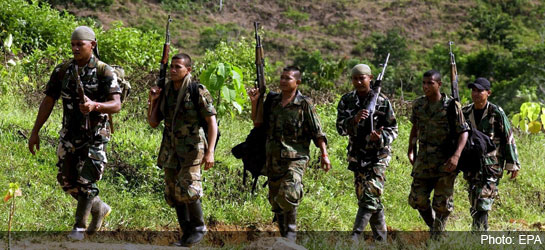
Colombian investigative website Verdad Abierta says that 2010 is the most violent year since the demobilization of the paramilitaries in 2006, due to the rise of emerging criminal groups.
Summarizing information released by NGOs Human Rights Watch (HRW) and Indepaz, and the government’s National Commission for Reparation and Reconciliation (CNRR), as well as from police sources, Verdad Abierta analyses the emerging criminal groups. The website says that massacres are up 25% to 153 cases so far in 2010, and murders are up 16%.
Estimates on the number of members in these groups range from 2,200, according to government security agency DAS, to 10,200, according to HRW.
Verdad Abierta lists a number of “similarities” between the criminal groups and the officially demobilized paramilitaries, as noted in CNRR report; that the groups use the same tactics; committing massacres, carrying out forced disappearances, and targeting community leaders and displaced people.
Another similarity, according to the CNRR, is that the emerging criminal groups are funded through similar ventures to the paramilitaries, specifically narco-trafficking, extortion, gambling, and currency exchange offices. Like the paramilitaries, these groups also have branches and interests that reach across the country and sometimes internationally.
Many members of the groups were in the paramilitaries, often as mid-level commanders, some of whom failed to demobilize and some of whom returned to crime after demobilizing.
The emerging groups are distinct from the paramilitaries, however, as they tend to be smaller. Some AUC fronts had up to a thousand members, according to the CNRR, whereas the new groups have fewer members and carry smaller arms.
The new bands are less stable and less centralized, with internal conflicts, and are involved a shifting system of alliances with each other. The same groups may be allied with each other in one region and in conflict in another region, explains the website.
Verdad Abierta says that the new bands are different in aim to the paramilitaries; though they claim to oppose guerrilla groups, this is not their focus, and they are even allied with the FARC in some areas. This is in contrast to the AUC, which was set up to combat guerrillas and their sympathizers.
The new bands are also more strongly opposed by the Colombian security forces, which have arrested a large number of members, whereas the paramilitaries had close ties with state forces.

